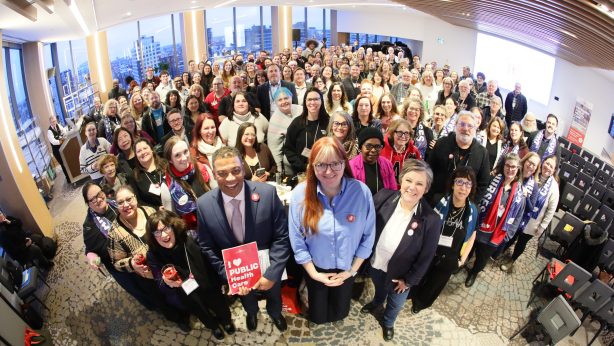Advocates want governments to keep pharmacare promise
With the one year anniversary of the Pharmacare Act becoming law on Oct. 10 approaching, advocates have been waiting for provinces and territories to sign deals with the federal government for free diabetes and contraceptives coverage. News last week sheds light on the hold up.
New Brunswick Health Minister John Dornan told the NB Media Co-op that, “Pharmacare in N.B. would have cost us a lot of money, more than we have. The federal offer was much less than it would have cost us.”
Dornan did not elaborate on the offer on the table but recent analysis by the Canadian Centre for Policy Alternatives estimated New Brunswick’s pharmacare money at approximately $136 million.
Dornan added, “Between insurance, drug cards through social development and a good provincial drug plan with low premiums for lower-income people, New Brunswickers are relatively well covered. We have asked the Federal Minister to reconsider their offer, and we continue to be hopeful.”
A 2024 Environics poll commissioned by the Canadian Health Coalition paints a different picture of drug access in New Brunswick. Of the New Brunswickers polled –
- 56 per cent said not being able to afford prescription drugs or medical devices is a major concern.
- 24 per cent said they are not filling/renewing a prescription, or they are making it last longer (e.g., skipping doses, splitting pills) due to cost.
- 27 per cent said they hesitated about quitting/changing jobs because of worries about losing prescription drug coverage.
- 21 per cent said they or someone with diabetes in their household would personally benefit from pharmacare.
New Brunswickers, with Albertans and British Columbians, also top the list of Canadians skipping or delaying doses of their medicine due to costs, according to a survey done before pharmacare became law in 2024. A 2024 NB Media Co-op story reported costs for low-income diabetes patients reaching hundreds of dollars per month.
In response to Dornan’s comments, Steven Staples, National Director of Policy and Advocacy of the Canadian Health Coalition, told the NB Media Co-op, “If New Brunswickers are well covered, then why did the Liberals promise free contraception? We know that one in every four Canadians have trouble paying for their medications and it’s more prevalent for people at the lower end of the socio-economic scale.”
Manitoba, British Columbia, PEI and Yukon have signed pharmacare deals with the feds, but the other provinces and territories have not. The gap is leaving a patchwork of coverage across the country. For example, a resident of PEI has their diabetes medication covered publicly but loses that benefit if they move to neighbouring New Brunswick or to Ontario or Alberta.
Pharmacare is expected to be a top issue for MPs when they return to the House of Commons in September. Reports from the National Pharmacare Committee of Experts and the Canada Drug Agency are due on October 10.
Do not break pharmacare promise, say advocates across Canada
Canada’s Health Minister Marjorie Michel was in New Brunswick last week as the Canadian Health Coalition, Ontario Health Coalition and Ontario Federation of Labour were rallying to protect public health care outside the premiers’ meeting near Huntsville.
When reporters pressed Michel on pharmacare, she did not commit to signing new pharmacare deals with all provinces and territories. The Telegraph-Journal responded with the headline, “Pharmacare money may be gone.”
News this week of a future $1 billion gutting of Health Canada’s budget adds to the worries of pharmacare advocates who say the national universal pharmacare program needs more money, not less.
Staples told iPolitics: “I think this is sending a very bad signal to provinces and territories that have been contemplating joining the program. The legislation only passed in October, and we got four agreements done by the time the election was called, and there are other provinces in the queue.”
New Brunswickers are not the only ones demanding access to pharmacare.
In June, CBC reported that Nova Scotia wants “to go back to the table” on pharmacare, while Newfoundland and Labrador Health Minister Krista Lynn Howell told CBC in May, “We know that pharmacare is something that will benefit individuals all across this country. Newfoundland and Labrador will not be left behind,” she said.
Yvonne Earle, a Council of Canadians activist in Newfoundland and Labrador, told CBC: “One of the things that Canadians pride themselves on is their health-care system … [and] our health-care system now is under considerable strain… And one of the ways we can improve it is getting pharmacare for all Canadians.”
Staples told CTV Regina this week that Saskatchewan could receive up to $2 million for pharmacare.
Elizabeth Kwan, senior researcher with the Canadian Labour Congress, in an interview with Canadian Press on Monday, noted that many people depend on drug coverage through their workplace insurance plans, and with layoffs and job losses in tariff-affected sectors like manufacturing industries, “this is why we need a universal public system.”
Pharmacare’s benefits are life-changing
While British Columbia has signed a pharmacare deal with the federal government, AccessBC, an advocacy group promoting free prescription contraception, has organized a “pharmacare should not depend on your postal code” letter writing campaign. They say hundreds of thousands of people have been able to access prescription contraception in British Columbia since the province made contraception free in 2023.
“This proves not only that cost is a significant barrier keeping people from accessing the most reliable forms of contraception – it also shows that when the cost of prescription contraception is removed, the impact on people’s ability to access it is immediate and significant,” according to AccessBC.
Dru Oja Jay, Executive Director of the Council of Canadians, argues, “Rather than putting pharmacare on ice to pay for overpriced F-35 fighter jets or Trump’s ridiculous Golden Dome, we should seize this moment to expand pharmacare and help millions of Canadians who are struggling to access life-sustaining care.”
Mike Bleskie, a patient advocate living with Type 1 diabetes who presented to the Standing Committee on Health with the Canadian Health Coalition’s Steven Staples last year, says: “Universal, single-payer, publicly funded pharmacare will be life-changing for millions of Canadians, particularly those with chronic conditions like diabetes.”



